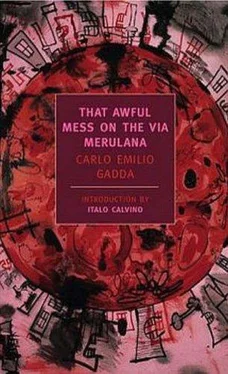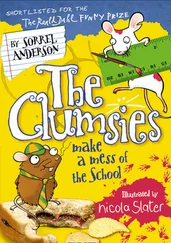Carlo Gadda - That Awful Mess on the via Merulana
Здесь есть возможность читать онлайн «Carlo Gadda - That Awful Mess on the via Merulana» весь текст электронной книги совершенно бесплатно (целиком полную версию без сокращений). В некоторых случаях можно слушать аудио, скачать через торрент в формате fb2 и присутствует краткое содержание. Год выпуска: 2007, Издательство: NYRB Classics, Жанр: Современная проза, на английском языке. Описание произведения, (предисловие) а так же отзывы посетителей доступны на портале библиотеки ЛибКат.
- Название:That Awful Mess on the via Merulana
- Автор:
- Издательство:NYRB Classics
- Жанр:
- Год:2007
- ISBN:нет данных
- Рейтинг книги:5 / 5. Голосов: 1
-
Избранное:Добавить в избранное
- Отзывы:
-
Ваша оценка:
- 100
- 1
- 2
- 3
- 4
- 5
That Awful Mess on the via Merulana: краткое содержание, описание и аннотация
Предлагаем к чтению аннотацию, описание, краткое содержание или предисловие (зависит от того, что написал сам автор книги «That Awful Mess on the via Merulana»). Если вы не нашли необходимую информацию о книге — напишите в комментариях, мы постараемся отыскать её.
Italo Calvino, Pier Paolo Pasolini, and Alberto Moravia all considered
to be the great modern Italian novel. Unquestionably, it is a work of universal significance and protean genius: a rich social novel, a comic opera, an act of political resistance, a blazing feat of baroque wordplay, and a haunting story of life and death.
That Awful Mess on the via Merulana — читать онлайн бесплатно полную книгу (весь текст) целиком
Ниже представлен текст книги, разбитый по страницам. Система сохранения места последней прочитанной страницы, позволяет с удобством читать онлайн бесплатно книгу «That Awful Mess on the via Merulana», без необходимости каждый раз заново искать на чём Вы остановились. Поставьте закладку, и сможете в любой момент перейти на страницу, на которой закончили чтение.
Интервал:
Закладка:
V
BUT the statements of Ceccherelli, of his "boy in the shop," one Gallone, a handsome old fellow, thin as a rail, with eyeglasses, and of an apprentice, a certain Amaldi, or Amaldini, were entirely in Giuliano's favor. Ceccherelli, backed up by the other two, confirmed in every detail the orders he had received more than two months before from the poor signora, the various stages in the preparation of the fob: "It's for a relation of mine who's getting married, so do your very best." The signora had shown him a gold signet ring, heavy, yellow-gold, with a blood-jasper, very handsome with the carved initials G.V. in what you might call Gothic lettering: "I want the stone for the chain to match this one." She had left him the ring. He had taken an impression in wax: first of the monogram, then of the whole stone, which projected from its setting. Liliana Balducci had then come back to the shop two more times, she had selected the stone from five he had shown her, after he had laid in a special stock from Digerini and Coccini, the wholesalers; he had dealt with them for years, so they hadn't raised any objection to giving him the stones on loan. It was also fully confirmed, from the same source, that the opal — very handsome stone, but with that curse on it like all opals — was to be taken over by Ceccherelli, who had in fact, taken it over, adjusting the price accordingly, despite that R.V., which was faintly engraved on it, "because, as far as I'm concerned, if you'll pardon the expression, I don't give a good goddamn about all these old superstitions. Why, you'd think you were in the Middle Ages, indeed you would. Now, in all conscience, I'm interested in doing business, in as straightforward a way as possible. In the forty years I've had my shop, believe me, Doctor, there has never been a word, not a shadow of a doubt, even for so much as a pin. And besides, just to be on the safe side, I stuck it right in a special drawer I keep for such things, as soon as I took it out of its setting, with pincers, not even touching it with my fingers, so to speak. As for the pincers, I stepped next door to the barber's and disinfected them with alcohol: and as for the gem in question then, I locked it away in that drawer, the last one on the way to the bathroom. You know the one, Alfredo; and so do you, Peppino: it's so packed with coral horns that if that opal decided to put the evil eye on the shop. . on my shop? Poor opal. It's like a capon in there, in the midst of so many roosters!. . with a sharp beak too, I can tell you."
As for the ring, he had given it back to the signora after a couple of days, "if I remember rightly, it was when she came back to the shop to look at the jaspers." He was to give the fob to Giuliano in person, who was to come by and collect it, bringing the chain with him: "yes, that one": he recognized it perfectly. "That chain," Liliana had said, "You know? Signor Ceccherelli, you know it well. Remember? The one you estimated at two thousand lire?. . That's the one I gave away. And grandfather's ring, too, with the diamond, you remember? You estimated it at nine thousand five hundred?" Ingravallo also showed him the ring. "This is the one, no question about it: a diamond of twelve and a half carats, to say the very least. A marvelous fire." He took it, turned it around, looked at it: he held it up against the light: "Time and again grandfather used to say to me: remember, Liliana, this must stay in the family! You know to whom I mean!" The words of her grandfather, a sacred formula almost, for her: that was clear: well, she had repeated it twice, there in the shop: "isn't that so?": in the presence of Gallone, and in the presence of Giuseppe Amaldi: both of whom nodded their confirmation. To Amaldi Liliana herself chose to explain every detail: what the two intertwined letters he had to engrave were to be like, and how she wanted the stone set: jutting out slightly from the oval setting: Ceccherelli, with his little fingernail followed the firm binding of the green stone, mounted as a seal, that is to say, projecting a bit from the setting: and with a little band of gold on the back, to conceal the rough side, and to enclose it.
In addition to the jewelers, who were heard in the morning, it must be said that the Valdarena family and its ramifications, that is to say Giuliano's grandmother, Balducci himself, and the two aunts from Via dei Banchi Vecchi, and Uncle Carlo, Aunt Elvira, and more or less all the kinfolk had been groping around for three days, some in this direction, some in that, seeking the road to salvation, the way to get Giuliano out, out of the mess in which he found himself, poor boy, through no fault or sin of his own. Easier said than done. But after the three clarifying statements of the three jewelers, which were one good thing, there came immediately the even better statement of the head cashier of the bank, the man from the Banco di Santo Spirito. From the master file of her account (the savings account) it turned out that she, Liliana, had withdrawn the ten thousand lire, right on the 23rd of January, two days before making the present, which she had given him on the 25th, at her house, when he had gone to visit the Balduccis and had found her alone. The head cashier, Public Accountant Del Bo, knew Liliana: he had done as she requested, that time: he happened to be at the window, number 8, full of paternal smiles. A few minutes before noon. Yes, yes, he remembered perfectly: at the moment when he was snapping out those ten notes on the glass counter — ten filthy, freckled old blankets, they were, the mangy kind, that have come from the accordionlike wallet of some sheep-trader from Passo Fortuna or from the wine-damp counter of a tavern in the Castelli— she had said to him, with that soft voice of hers and those deep, deep eyes: "Please, Signor Cavalli, see if you can't give me fresh, clean bills, if you have them: you know how I like new ones. .," she had called him Cavalli rather than Del Bo. "Like this?" he had said to her, taking away the dirty ones he had in his hand; and he showed her a fresh pack, in the air, against the light, holding it by one corner, letting it dangle from two fingers. "Nice and shiny, look!. . They just arrived yesterday from the Bank of Italy: the mint has just spat them out. They have a nice odor: sniff. The day before yesterday morning they were still at Piazza Verdi. {23}What? Afraid of germs? You're right… a handsome lady like yourself."
"No, Signor Cavalli. . the fact is that I have to make someone a present," Liliana had said. "A wedding present?" "Yes." "Ten thousand-lire notes make a nice present, especially for a young couple." "It's a cousin, who's like a brother to me. You've no idea. . I was like his mother, when he was a baby." Those were her very words: he remembered perfectly; he could swear it on the Bible. "Best wishes to the happy couple: and to you too, Signora." They had shaken hands.
*** *** ***
Sunday the 20th, in the morning, further information from Balducci to the two officials: then to Doctor Fumi alone, when Don Ciccio, shortly after noon, was led to "concern himself with another matter" and preferred "to go out for a moment." In all truth, there was no lack of other matters on his desk. Indeed, the desk overflowed onto the shelves, and the shelves to the files: and there were people coming up and going down, and more waiting outside: some smoking, some throwing away the butt, some hawking and spitting against the wall. All heavy and smoky, the genteel clime of Santo Stefano del Cacco, in a syncretic odor, a little like a barracks or the second balcony of the Cinema Jovinelli: between armpits and feet, and other effluvia and aromas more or less of March, which it was sheer delight to sniff. Of "other matters" there was enough to wallow in, to swim in: and people in the waiting room! Madonna! more than at the foot of the great Tower of Babel. They were hints (and better than hints) of "an intimate nature," the ones proferred by Balducci: in part spontaneously, slipping into them, one would say, the hunter-traveler abandoning himself to that kind of logor-rhea to which certain suffering souls succumb, repenting a little perhaps of their past behavior, as soon as the phase of softening sets in, as the bruise follows the blow: posttraumatic cicatrization: when they feel that forgiveness is theirs, from Christ and man: and a part, instead, drawn from him with the gentlest oral string, through a civil dialectic, through a passionate peroration, a vivid flashing of the eyes, an extracting maieutics and that charitable poppy-heroin, the voice and the gestures of Parthenope and Vesuvius: the action both bland, and the same time, persuasive, ahah! of an amiable type of forceps. And out came the tooth. Liliana, by now, had got it into her head that, with her husband… she wouldn't ever have any babies: she considered him a good husband, of course, "from every point of view": but when it came to a baby in view, no, not a sign. In ten years of marriage, almost, well! not even the hope: and she had married at twenty-one. The doctors had spoken frankly: it was he or she. Or both. She? To prove it wasn't her fault she would have had to try with another. This is what Professor D'Andrea told her, too. So, from those continuous disappointments, from those ten years, more or less, where her grief had put down such deep roots, her humiliation, despair, tears, from those useless years of her beauty dated also those sighs, those "ah me's," those long looks at every woman, at those who were full, ah!. . (When hearts heave a sigh, then sorrow is nigh, as the saying goes.)… at children, at plump maidservants, all leafy with celery and spinach, in their shopping bags, as they came from Piazza Vittorio in the morning: or with their asses in the air, bending over to blow a kid's nose, or to touch him, to see if he's wet through: for those are the moments when you see her at her best, the maidservant, all health, all thighs, from behind: now that it's the fashion to wear such short underpants — if they wear any at all. She looked at the girls, she returned, for a flash, with a note of profound melancholy, the bold glances of young men: a caress, or a benevolent license, mentally bestowed on the future bestowers of life: on whatever seemed to her to contain the certainty, the germinal verity, the kernel of secret growth. Hers was the limpid assent of a fraternal spirit: to those who outlined the pattern of life. But the years were rushing past, one after the other, from their dark stables, into nothingness. From those years, as her educational restriction operated, the first evidence then the gradual exacerbation of a delirium of solitude: "rare in a woman," Doctor Fumi interjected softly: "and in a Roman woman even more. .": "yes, we like our company, we Romans," Balducci agreed: and that need, quite to the contrary, to rest in spirit against the physical image of another, on the visible geneticizing of people, and of the poor: that mania… for giving double sheets to the maids, giving them a dowry at all costs, urging to marriage those who wanted nothing more: that notion of wanting to cry, then, and to blow her nose, that gripped her for whole days, poor Liliana, when they really did up and marry: as if, when it was done, she felt envious. An envy that gnawed at her liver: as if they had done it to spite her, marrying, and to say then: "Look at me: after four months, a kid on the way! Our little boy weighs eight pounds, he gains two pounds a month." On certain mornings all it took was for some woman friend to say: "Have you seen Clementina? What a stomach she has." and Liliana's eyes would be red. "Once she almost made a scene with me, her husband, over a girl from Soriano al Cimino: a peasant who came to Rome on the bus from Viterbo, to bring me a slice of wedding cake. I don't even want to see her, that shameless thing! she yelled. The bride, poor kid, came in with her husband, and with a belly on her like a balloon on the feast of San Giovanni, when they send up fireworks. They said: we brought you some wedding cake. Of course, they were kind of embarrassed. So I said to them, laughing: it looks like the air is plenty healthy, up there on the Cimino: she blushed and looked down at her stomach, like the Virgin when the Angel explains the business to her in the Annunciation: then she got her nerve up, though, and answered: well, Signor Balducci, that's how it goes. We're young. We kind of hurried things. . When the baby comes, nobody will remember any more, whether there was a priest or not to bless us. But don't worry, now we've been blessed, all three of us." The years! like a rose wasting, the petals falling one after another. . into nothingness.
Читать дальшеИнтервал:
Закладка:
Похожие книги на «That Awful Mess on the via Merulana»
Представляем Вашему вниманию похожие книги на «That Awful Mess on the via Merulana» списком для выбора. Мы отобрали схожую по названию и смыслу литературу в надежде предоставить читателям больше вариантов отыскать новые, интересные, ещё непрочитанные произведения.
Обсуждение, отзывы о книге «That Awful Mess on the via Merulana» и просто собственные мнения читателей. Оставьте ваши комментарии, напишите, что Вы думаете о произведении, его смысле или главных героях. Укажите что конкретно понравилось, а что нет, и почему Вы так считаете.












